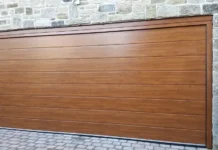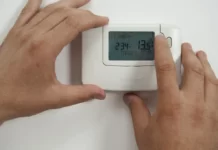Pools of water surrounding the water heater tank may indicate leakage. If you find yourself in such a condition then neither panic nor call a technician immediately. First, confirm whether it’s a leakage or a normal condensation phenomenon. After inspecting the water heater, try to figure the real issue out by yourself if you can.
Some precautions must be taken before handling such a task. We will mention them first because your safety is a top priority.
- Make sure that your gas or electricity connections should be cut off
- If you don’t think yourself capable then call for professional
Checking Water Heater for Leakage
- Put off the gas or electric supply
- Close the cold water inlet towards the heating cavity either by turning the dial clockwise or by rotating the hydro seal to 180 degrees. Then, examine the cold water inlet for leakage.
- Look for leakages around the tank wall by checking the Temperature and Pressure valve.
- Finally, inspect the drain valve and the tank’s bottom to find the area of leakage.
5 Signs of a Water Heater Leaking
Both gas or electric heaters share the same functions having distinct sources of energy. Let’s explore the significant signs of their leakage in the below-mentioned bullets:
1. Hot or Cold Water Supply Connection
There are two pipes emerging at the top of the water heaters. One is called a cold water inlet and the other one is called a hot water outlet. There is a very rare chance of water leakage from the upper areas. You can check them for their sealing either fit or not.
2. Corrosion of Drain Valve
The impurities in water often tend to settle down thus forming a layer in the bottom. These sediments block the drain valve thus allowing its corrosion. With time, water starts seeping out from cracks.
3. Cracks in the Heating Cavity
The water retained in the tank or heating cavity is responsible for its prolong rusting. This may results in its perforation thus allowing water to trickle drop by drop.
4. Loose Pressure Relief Valves
Pressure relief valves act as stress relievers. They provide an alternate pathway for steam in times when internal temperature increases. If absent they may cause the tank to blow up. Ensure their proper fitting to avoid future worries.
5. Erosion of Anode
An anode rod is an essential component of water heaters. They attract the ions present in water to prevent sedimentation. For that reason, they are prone to decay. Remember to renew them after two to four years.
How to Fix Water Heater Leaking Issues
We have discussed all the possible ways that may cause your water heater to leak. But how to fix them?
Some issues are DIY and can be resolved firsthand without calling a professional. You may use the following tips:
1. Fix the Sealing Issues
Use plumbing tape and fix it with the help of a pipe wrench to resolve sealing issues. Ensure all the pipe fittings are sealed properly.
2. Overcome the Drain Valve Issue
Corrosion may cause the drain valve to be replaced. You can call any professional technician to fix it.
3. Tank or Heating Cavity Replacement
If any crack develops within the heating cavity then it may not be observable. It is because the tank consists of two layers. One is the inner cavity layer and the other is the outer insulating layer. The only solution for the inner layer damage is tank replacement. You can call the specific water heater company and register your issue. They will send their own working professionals for it.
How to Stop Water Heaters from Further Damages
If your water heater is working smoothly and wants to avoid future damage then you can follow the listed one to be done:
- Remember to check for loose fittings after a period of a month.
- Clean your water heating tank once a year.
Wrap Up
With the above-mentioned details, we hope that your query has been cleared that why is my water heater leaking and how to fix it? In the same way as all mechanical appliances, water heaters wear out over time. It is due to the natural phenomenon of corrosion. If your heater exhibits the aforementioned leakage issues, follow the provided advice or seek a professional worker.














